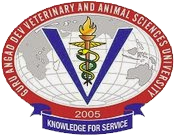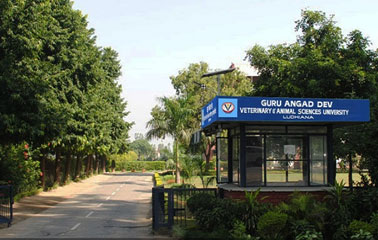

To provide efficaciously skilled human resource; technical support; and outreach backup to the fisheries sector of the state, College of Fisheries, Guru Angad Dev Veterinary and Animal Sciences University, was established in April, 2008 to produce qualified fisheries professionals; to carry out basic, applied and adaptive research to achieve sustainable aquaculture production/productivity targets; and to disseminate the developed technologies to various stakeholders constituting the fisheries supply chain.
The College of Fisheries has five departments:
The college has competent experienced faculty and is well equipped with lab and farm facilities for taking up its teaching, research and extension programs effectually. The college offers the following academic programs:
The curriculum of the UG degree programme (B.F.Sc.) has been adopted as per recommendations of the 5th Deans’ Committee of the Indian Council of Agricultural Research (ICAR) w.e.f academic session 2016-17 and is divided into eight semesters. The first 6 semesters include coursework (theory and practical) related to various aspects of fisheries, including taxonomy, anatomy, physiology, biology, biochemistry, culture techniques, nutrition, breeding, disease management, aquatic ecology, aquatic animal health management, genetics, biotechnology, fisheries resource management, aquatic pollution, aquatic biodiversity, post-harvest technology, regulations and policies, marketing and trading, economics, statistical methods, extension education and swimming. During the last/4th year (7th and 8th semester), the B.F.Sc. students undergo ‘Student Ready Program’, including i) In-Plant Training (8-Weeks), ii) Rural Fisheries Work Experience (8-Weeks) and iii) Educational Tour (4-Weels/In & Outside State) during the 7th semester; and i) Experiential Learning Program ii) Skill Development and iii) Project Work & Seminar during the 8th Semester; to enhance the professional competency of the outgoing fishery graduates.
The curriculum of M.F.Sc and Ph.D. is also based on ICAR regulations (BSMA) covering advanced courses and basic/advanced research in the related/relevant subject, with thesis (M.F.Sc.)/dissertation (Ph.D) as an integral part of the degree program.
Tailor-made one-month short courses have also been initiated by the college in industry-oriented fields, to instil entrepreneurial skills among fishery and other aspiring graduates/youth/stakeholders, to promote fisheries as a potential sector for entrepreneurship/career advancement at regional, national and international levels. Fishery professionals i.e., graduates (B.F.Sc.) and postgraduates (M.F.Sc. and Ph.D.) and certificate holders are eligible to seek promising job opportunities in the public/ private sector in India i.e., State Fisheries Department, Fish Farmers Development Agencies (FFDAs), Colleges, Agricultural/Veterinary/Central Universities, Krishi Vigyan Kendra’s (KVKs), Fisheries Institute/Agencies, Banking Sector, Hatcheries, Aquaculture Farms, Feed Mills, Pharmaceuticals, Processing Plants, Trading, Export etc. Further, Fisheries professionals also possess great scope for higher studies and placement overseas. Nevertheless, there are vast opportunities for self-employment/entrepreneurship development in fisheries sector.
